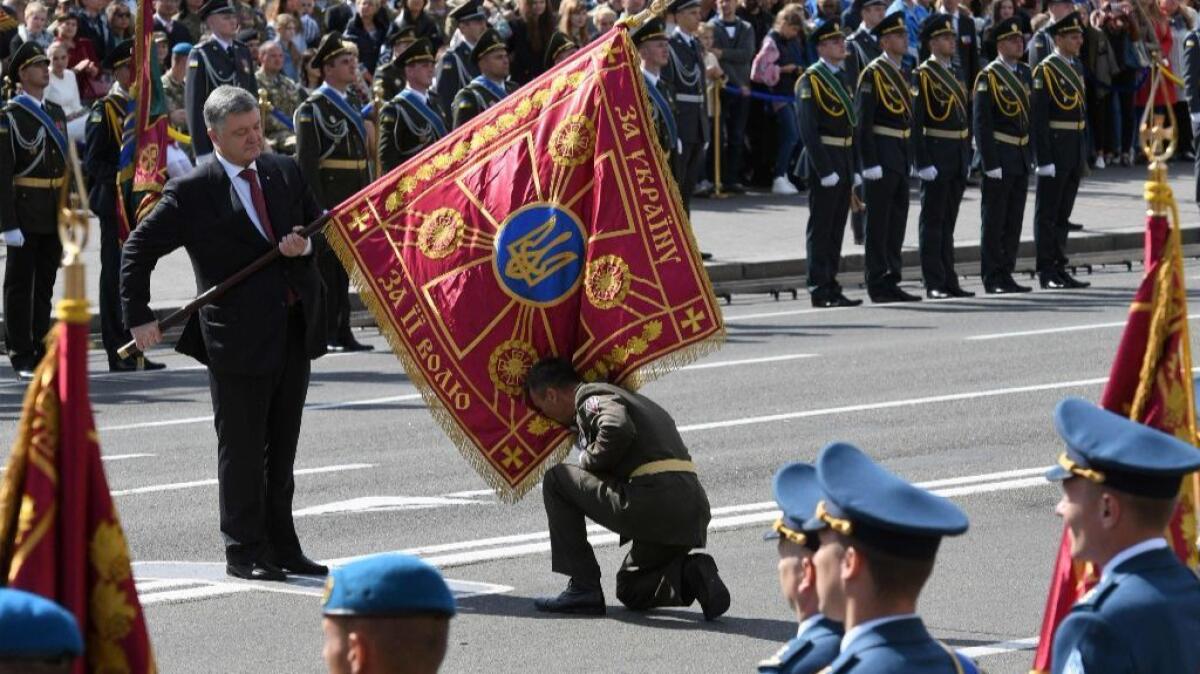U.S. decision to provide anti-tank missiles to Ukraine angers Russian leaders

Reporting from Washington — President Trump’s long-delayed decision to provide Ukraine with defensive lethal weapons signaled a new willingness to oppose Russian intervention in its neighbor, but has made European allies nervous that a recent hike in fighting could escalate.
The State Department said Friday that the administration would supply the government in Kiev with Javelin anti-tank missiles to destroy armored vehicles used by Russian-backed separatists in eastern Ukraine, and to raise the cost of Russia’s intervention in the conflict.
The Trump administration said earlier in the week that it also would permit sales of some small arms to Ukraine from U.S. manufacturers.
Ukraine long had sought the portable infrared-guided Javelins to blunt the insurgents’ advances. But some U.S. officials worried that providing the weapons could provoke the Kremlin to step up its military role and ruin any chance of easing tensions with Moscow.
Kurt Volker, Trump’s special envoy for Ukraine, recently warned that the deadliest fighting since February had erupted in eastern Ukraine. More than 10,000 people have been killed since mid-2014, when Russian military forces seized the Crimean peninsula and began supporting armed separatists in eastern Ukraine against the government in Kiev.
Both the Pentagon and State Department had recommended supplying the anti-tank missiles earlier this year. Officials in both Washington and Kiev stressed that the anti-tank missiles are defensive in nature.
“American weapons in the hands of Ukrainian soldiers are not for offensive [use], but for stronger rebuff of the aggressor [and] protection of Ukrainian soldiers and civilians,” Ukraine’s president, Petro Poroshenko, said on Facebook. “It is also a trans-Atlantic vaccination against the Russian virus of aggression.”
Heather Nauert, the State Department spokeswoman, appeared to downplay the move. “U.S. assistance is entirely defensive in nature, and as we have always said, Ukraine is a sovereign country and has a right to defend itself,” she said.
Russia, which has officially denied supporting the insurgents in eastern Ukraine, called the U.S. decision “dangerous” and said Washington was acting as “an accomplice in fueling a war.”
Sergei Ryabkov, Russia’s deputy foreign secretary, also blamed what he called anti-Russian “Russophobia” in Washington for the decision to arm what Moscow portrays as fascist Ukrainian nationalists.
“U.S. weapons are capable of leading to new casualties in our neighboring country, and we cannot remain indifferent to that,” Ryabkov said.
German Chancellor Angela Merkel and French President Emmanuel Macron did not overtly criticize the U.S. decision, but urged all combatants to abide by the much-violated 2015 ceasefire deal known as the Minsk Agreements.
France and Germany brokered the agreement, which called for withdrawal of heavy weapons from frontline positions, as well as safe delivery of humanitarian aid and the exchange of prisoners.
“There is no alternative to an exclusively peaceful solution to the conflict,” Merkel and Macron said in a joint statement.
Congress approved $500 million in aid to Ukraine this year, but some congressional leaders, including Sen. John McCain (R-Ariz.), chairman of the Senate Armed Services Committee, urged the administration to also provide lethal weapons.
In a statement, McCain said providing the Javelins “sends a strong signal that the United States will stand by its allies and partners as they fight to defend their sovereignty and territorial integrity.” He added: “Providing defensive lethal assistance to Ukraine is not opposed to a peace in Ukraine — it is essential to achieving it.”
Although President Trump has sought to improve relations with Moscow, his administration continues to view Russia’s intervention in Ukraine as a critical point of tension.
“It stands as the single most difficult obstacle to us re-normalizing the relationship with Russia, which we badly would like to do,” Secretary of State Rex Tillerson said on Nov. 28.
During the 2016 Republican National Convention, the Trump campaign removed language from the GOP platform that called for arming Ukraine, which long had been a popular Republican position.
Trump’s campaign manager was Paul Manafort, a lobbyist who had worked for pro-Russian politicians in Ukraine. In October, a federal grand jury indicted Manafort and his deputy, Richard Gates, on a dozen charges of fraud, conspiracy and money laundering for his work in Ukraine. They both have pleaded not guilty.
For more on international affairs, follow @TracyKWilkinson on Twitter.
More to Read
Sign up for Essential California
The most important California stories and recommendations in your inbox every morning.
You may occasionally receive promotional content from the Los Angeles Times.











